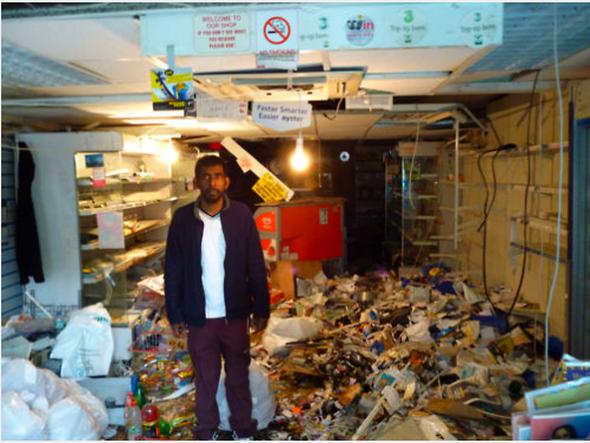GETTING OVEREXCITED ABOUT THE REVOLUTIONARY POTENTIAL OF SHOPLIFTING
A lot of radicals, dreaming of a return to the class struggles of the 1980s, see the recent outbreak of looting as a proto-revolutionary struggle.
Socialist Worker saw ‘the urban revolt spreading across Britain’.
So too, says Counterfire: ‘This is the reality of ‘nothing left to lose. This is the reality that leads young people to petrol-bomb supermarkets, burn out police cars, lob missiles at scores of riot cops, erect burning barricades’ Nothing Left to Lose
Over at Socialist Appeal they think that ‘These riots have a social cause and reflect a growing mood of anger amongst working class youth of all races which has been threatening to explode for some months now.’ 'Riots mood grows'
The Revolutionary Communist Group's Carol Brickley was excited by the 'uprising in Tottenham', which she saw as proof that 'fighting back is our answer to the ruling class'. (Uprising in Tottenham)
Richard Seymour thought that revolution was in the air, too: ‘The intention has been to show that the party of order can keep control throughout the coming battles. I hope, with every fibre in my being, that they cannot.’ 'Tottenham Calling'
(Later on Seymour was backtracking, saying that ‘The truth is that riots almost always hurt poor, working class people.’)
But it was Socialist Worker that had the biggest horn for the shoplifting. It was, they said, ‘an explosion of bitterness and rage.
‘This is what happens in a society of deep and growing inequality, where there are great pools of unemployment and poverty, where there is systematic police harassment and racism, and where many young people feel they have no future.
‘Just as with the student protests last year, it is the “lost generation” created by the Tories who are at the centre of these struggles’‘The state tries to discredit riots as the violence of a minority. That’s because it is terrified of mass resistance to issues like rising poverty and ongoing police violence. Anger at these injustices builds up like tinder—until someone lights a spark. Socialist Worker statement on the riots
Of course there is some truth that the breakdown in order came because of an increase in alienation among the young. But that does not justify imbuing the looting, and the attacks on working class communities with the character of a social uprising, as Socialist Worker did. For them:
‘Ordinary people, who feel invisible most of their lives, take to the streets and take centre stage.
 ‘It’s not about people smashing up their local area for no reason. It’s about them expressing their anger, wherever they happen to be’
‘It’s not about people smashing up their local area for no reason. It’s about them expressing their anger, wherever they happen to be’
Anger? No doubt there was some. More honestly there was a lot of excitement. The riots were more like the Saturnalia, or Fool's Night of old, a joyous venting for those who took part. But for others, like the smashed up 'Gay's the Word' bookshop, the people burned out of their homes in Enfield and Hackney, the young people beaten and robbed, it was no fun at all.
Straining to find a good side in the trashing of working class communities Socialist Worker insistst ‘But riots can win important gains.
‘The riots in Britain in the 1980s forced the state to retreat from hardline policing. The government was forced to spend money on inner city areas’ Riots, voice of the unheard
What actually happened after the Brixton riots is that the Tories won the next four elections. Police repression was not reined in, but cranked up, as was demonstrated by a further explosion in Tottenham in 1985.
Not all rioting is insurrectionary.
Here's Engels in 1886 on 'a favourite idea of [Henry] Hyndman's, namely a procession of "unemployed through Pall Mall ...
'The unemployed who followed them were ... mostly the types who do not want to work anyhow, hawkers, loafers, police spies, pickpockets. ... the masses of the Lumpenproletariat, whom Hyndman had taken for the unemployed, stremed through some fashionable streets nearby, looted jewellers and other shops, used the loaves of bread and legs of mutton whith they had looted solely to break other windows with ... broke the said windows, ditto the shop windows; they looted the wine dealers shops ...
'the police were nowhere to be seen and their absence was so marked that we were not alone in being compelled to think that it was intentional'. Letter to August Bebel
Mute Books Orders
For Mute Books distribution contact Anagram Books
contact@anagrambooks.com
For online purchases visit anagrambooks.com







